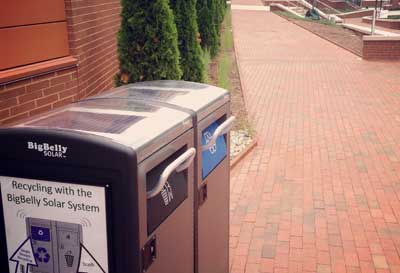
At NC State even some of the waste and recycling bins are going high tech. Six new solar-powered compactors are creating more efficient waste reduction and recycling processes in one of the most high-traffic areas on campus: the intersection of Cates Avenue and Morrill Drive.
With thousands of visitors each day, Talley Student Union, Carmichael Recreation Complex and the space between these hubs for campus life now feature six Bigbelly compactors that use solar energy to compress waste and recyclables, reducing the frequency at which a waste or recycling bin must be emptied.
“These high-capacity units are proving to be extremely beneficial for high-volume locations that would otherwise require service multiple times per day,” said Nessa Stone, operations manager for NC State’s Waste Reduction and Recycling Office. “One location near Talley was requiring service up to five times per day to prevent overflowing bins. After being replaced with a solar compaction unit, the collection frequency has decreased to once or twice a day.”
Less frequent collections reduce costs associated with fuel and maintenance staff time. In Raleigh, use of solar compactors created nearly $40,000 in annual savings during a 2012 pilot study, which prompted the city to install dozens of solar compactors.
Powered by renewable solar energy, the compactors remove air volume in the bins, resulting in up to five times the capacity of traditional trash or recycling bins. The compactors are also equipped with technology that monitors trash and recycling levels, notifying maintenance staff when the unit needs to be emptied.
“Solar compactors help keep our facility and grounds cleaner while also demonstrating use of solar energy and educating the campus community about our larger sustainability goals at Talley,” said TJ Willis, associate director of University Student Centers. “The most exciting part about the addition of these solar compactors is that it was a student idea.”
In 2014 with funding from the inaugural round of the NC State Sustainability Fund, students installed the first set of solar compactors on campus as a pilot project. Due to the success of the pilot, the Fund’s board awarded two additional grants in May for the purchase of five additional Bigbelly units for campus: three to be installed by University Recreation and two to be installed by student group Students for Solar before July 2016.